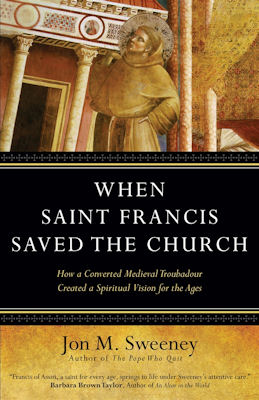
|
Posted June 24, 2014
Book: When Saint Francis Saved The Church Author: Jon M. Sweeney Ave Marie Press. Notre Dame, IN. 2014. pp. 175 An Excerpt from Chapter 1
This book approaches the story of Francis through a different understanding of the past. The past lives in us, whether we are conscious of it or not. The past never leaves us. we carry it around in our memories, in our knowledge, even in our bones. Have you ever hurt a finger or toe and the, weeks later, perhaps even years later, suddenly felt that pain once again in precisely the same place where it first occurred, even while sitting still? We carry the past with us just like that, whether we want to or not. It was the Mississippi novelist William Faulkner who said, "The past is never dead. It's not even past." So we occasionally read or study historical narratives in order to gain insight into what already, in some small way, animates our lives. In the reading, thinking, and discussing we come to understand better what lies deep within us. Some stories have the ability to illuminate the present more than others. Sometimes we can identify clear moments, people, or events that stand out from the rest. Every era is chock full of detail because life is always full and complicated --- so when history seems boring it is not so much because we can't see the forest from the trees, but because we have trouble seeing the seed that generated the forest or the spark that brought the forest down. History easily becomes clogged. Yet there are signal figures who are catalysts for rapid change. They are worth focusing on, not only because examining their lives closely helps us understand a previous era, but because understanding them can tell us something important but who we are today. Francis of Assisi was such a figure: extraordinary, seemingly unlike and inaccessible to us normal people. Yet studying his life offers us a way to understand ourselves and our place on this planet better. Francis originated a spirit that still animates us, nearly eight hundred years after his death. An Excerpt from the Book: Both the Cathar's teaching [putting little value on human life] and way of living, and [Pope Innocent III's brutal crusade against them] would have troubled Francis. Darkness was compounded by darkness. But most of all, Francis simply didn't understand dualism because it wasn't an accurate depiction of the world he lived in. when Francis walked in and looked around the world, he saw the good --- relationships, music, work, creatures --- and he experienced the beauty and love that overcome ugliness and hatred when people strive toward goodness rather than darkness. For Francis there was little separation between earth and heaven --- to him earth, as the saying goes, was full of heaven. And not only did he demonstrate an understanding of the world but his fresh worldview impacted his understanding of sin. Table of Contents: Part One: A New Look at Francis 1. Why the past matters 2. Now, forget what you've been told Part Two 3. Through a high view of friendship 4. By embracing the other 5. Through personal poverty 6. By developing a new spirituality 7. Through gentleness and care for creatures 8. By embracing death Part Three: Why Francis Matters Right Now 9. Looking for Francis today 10. Francis in the future |
|
